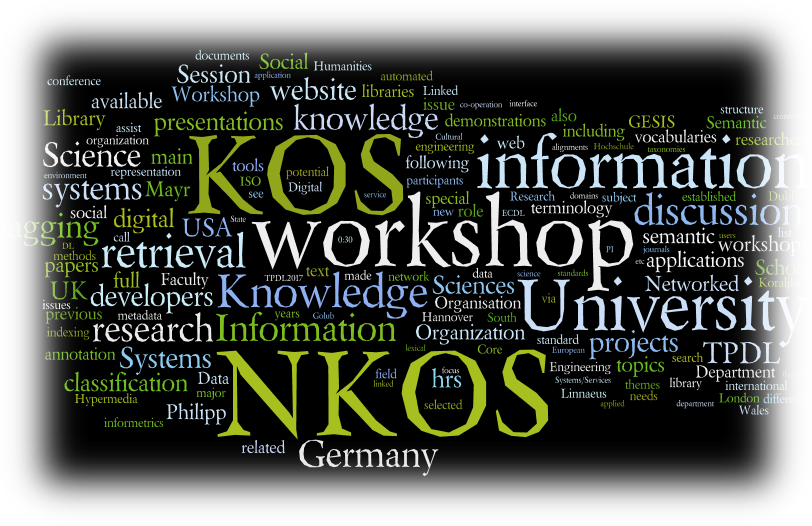Call for presentations and demos
The 18th European Networked Knowledge Organization Systems (NKOS) workshop will take place on Thursday 13th September 2018 as part of TPDL2018 and DCMI 2018 Conference to be held in the Faculty of Engineering of the University of Porto (FEUP), Portugal.
Important dates:
- Submission deadline: Tuesday 12th June 2018
- Notification of acceptance: Tuesday 10th July 2018
- Workshop: Thursday 13th September 2018

We invite submissions for:
a) Presentations (typically 20 minutes plus discussion time, potentially longer if warranted) on work related to the themes of the workshop (see below). An option for a short 5 minute project report presentation is also possible.
b) Demos on work related to the themes of the workshop (see below).
Authors may submit just an abstract (2-3 pages) or a regular/short paper to be published in the workshop proceedings (see 2016 and 2017 workshops). All submissions must be written in English following Springer LNCS author guidelines. Regular papers should have a maximum of 12 pages. Short papers should have a maximum of 6 pages. All submissions should be uploaded as PDF files to EasyChair and should include aims, methods, main findings, references).
All submissions will be reviewed by at least two independent reviewers. Please be aware of the fact that at least one author per paper needs to register for the workshop and participate in the workshop and present the work (via ppt). In case of no-show the paper (even if accepted) will be deleted from the proceedings AND from the program.
- Springer LNCS: http://www.springer.com/gb/computer-science/lncs/conference-proceedings-guidelines
- EasyChair: https://easychair.org/conferences/?conf=nkos2018
Workshop proceedings will be deposited online in the CEUR workshop proceedings publication service (ISSN 1613-0073) - This way the proceedings will be permanently available and citable (digital persistent identifiers and long term preservation). After the workshop, copies of presentations will be made available on the workshop website.
Themes for the NKOS workshop will be:
- Alignment/enrichment of metadata to existing KOS Linked Open Data. Recent years have seen an increasing trend to publication of KOS as Linked Data vocabularies. We need discussion of relevant issues and examples of KOS-driven metadata enrichment for a variety of data collection providers, including libraries, archives, museums, publishers, government agencies, international organizations, and also commercial organizations.
- KOS alignment/interoperability. KOS alignment or terminology mapping has been playing a vital role in NKOS for many years. We will continue this theme with discussion of specific case studies.
- Automatic KOS-based subject indexing / classification /entity-extracting is a classic KOS topic which has seen renewed interest regarding evaluation methodologies.
Further timely presentations/demonstrations will be selected from the following topics in the CfP: - KOS-based recommender systems. The suggestion of the right meaningful concepts is a mission critical phase for searchers in modern DL.
- Observatory for Knowledge Organization Systems – following recent Knowescape workshop with its main topics of KOS provenance and versioning.
- Meaningful concept display and meaningful visualization of KOS.
- Standards developments.
- Evaluation of KOS-based systems – methods and practical experience.
KOS applications are a regular and important part of NKOS workshops. Example topics include: - KOS in e-Research metadata contexts - intersection between research data and KOS
- Social tagging. What is the role of social tagging and informal knowledge structures versus established KOS? (How) can tagging be guided and informed by KOS?
- Users interaction with KOS in the online environment.
- KOS and learning. What is required to use KOS effectively to convey meaning, to assist users to express their information needs to assist in sense making and learning?
- Multilingual and interdisciplinary KOS applications and tools.
- Specific domains, such as environmental, medical, new application contexts, etc.
More information on the workshop can be found in the workshop proposal